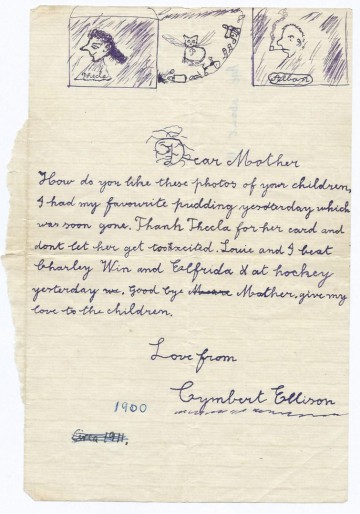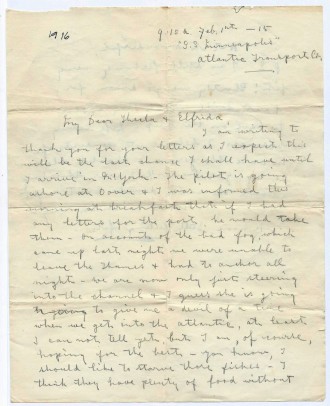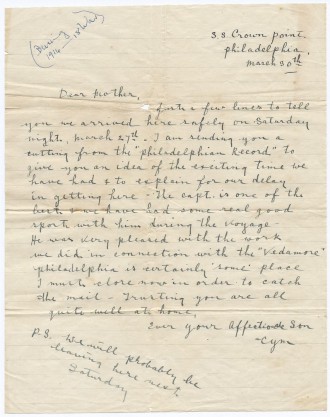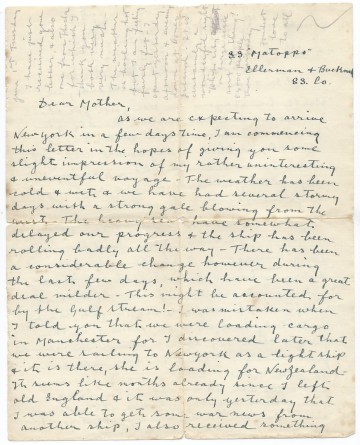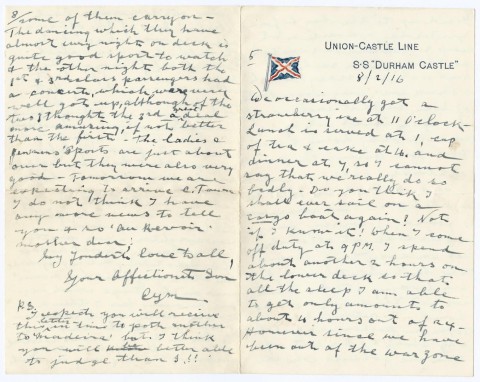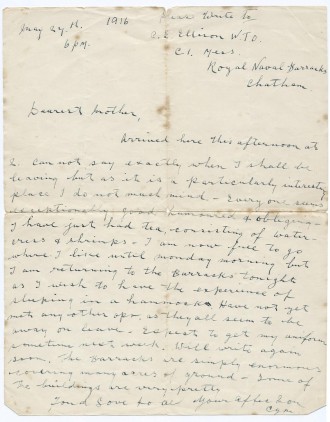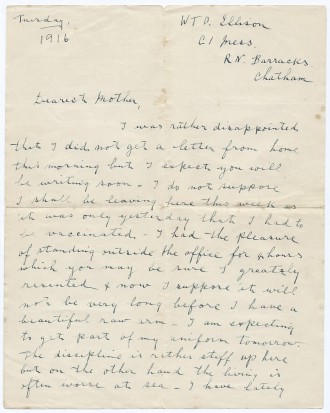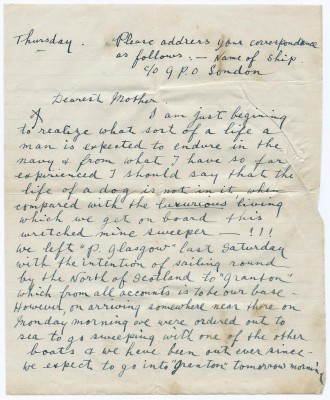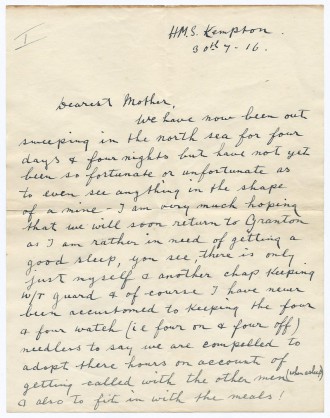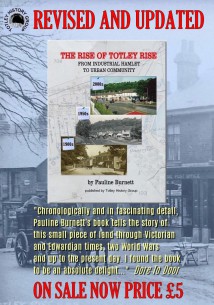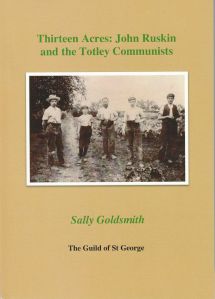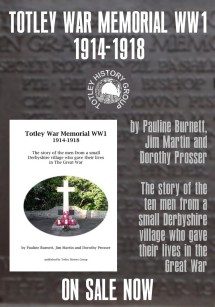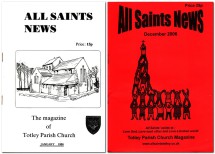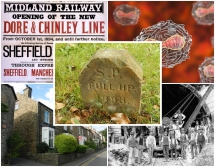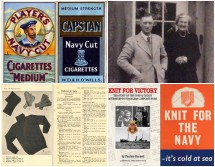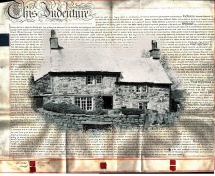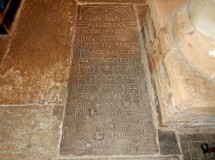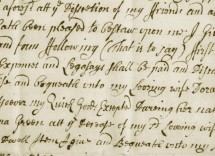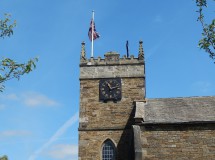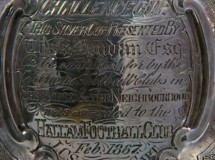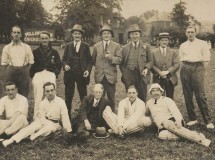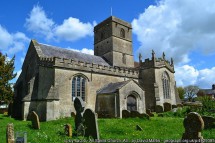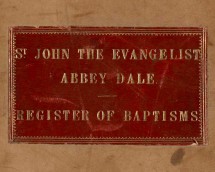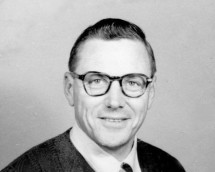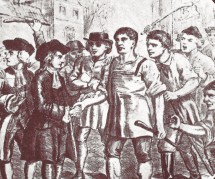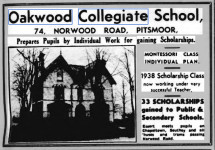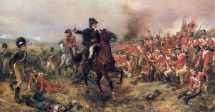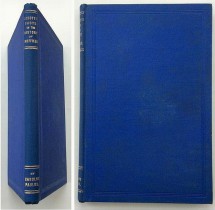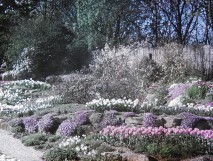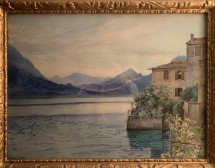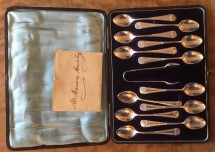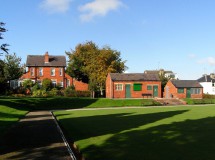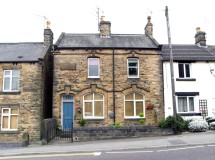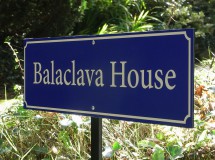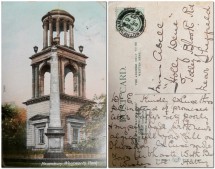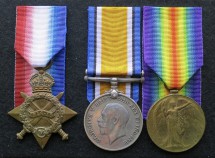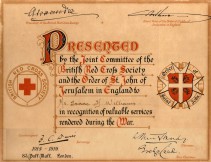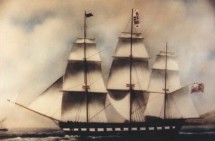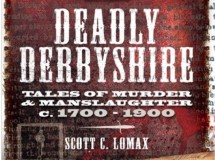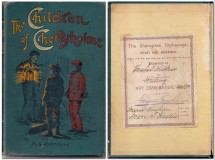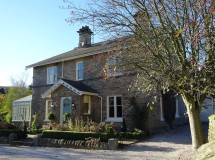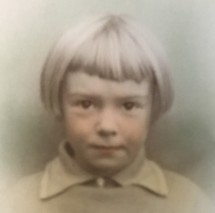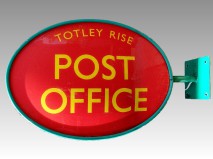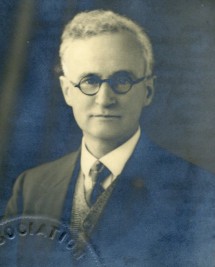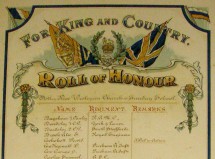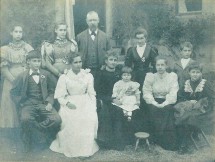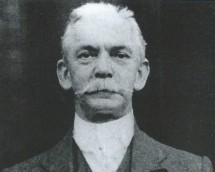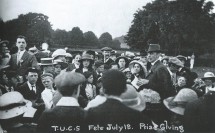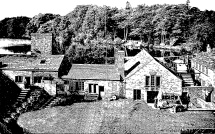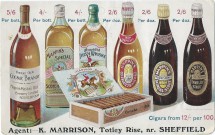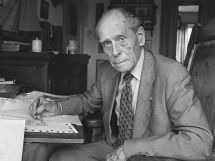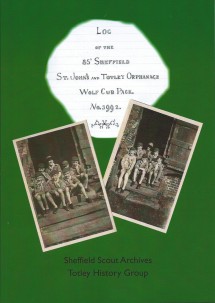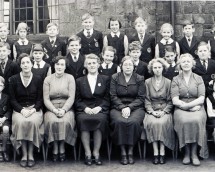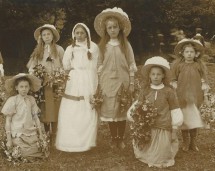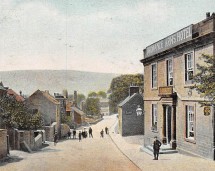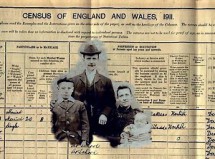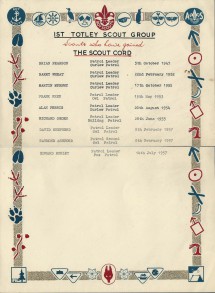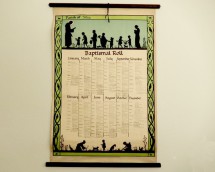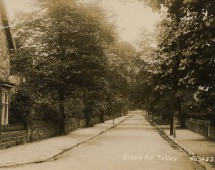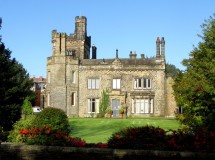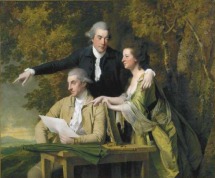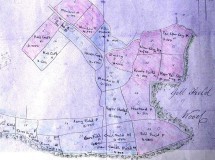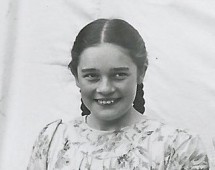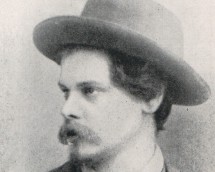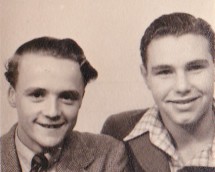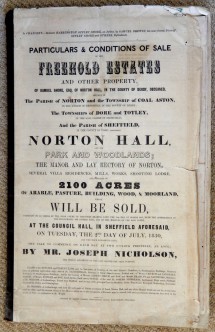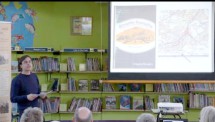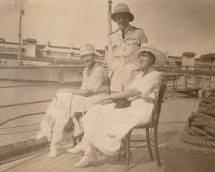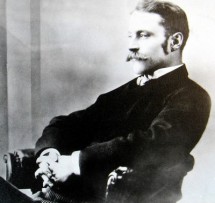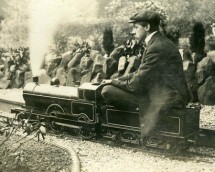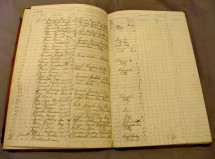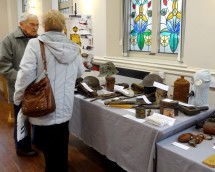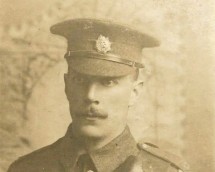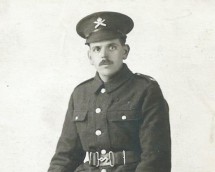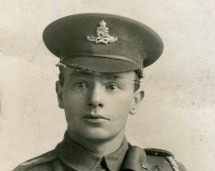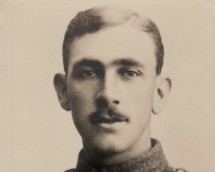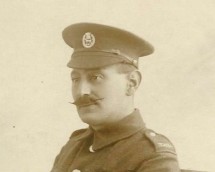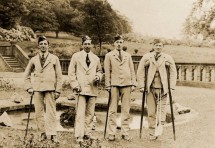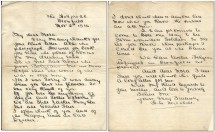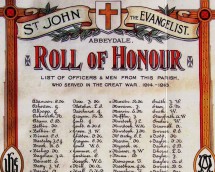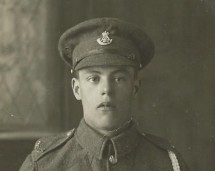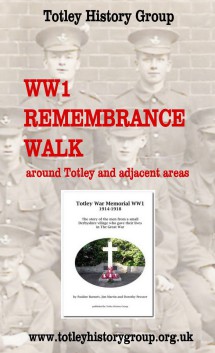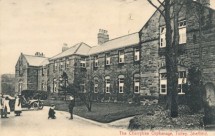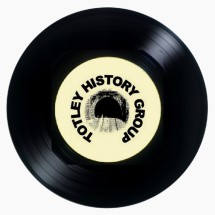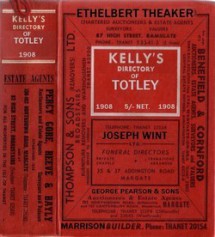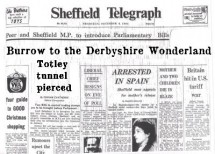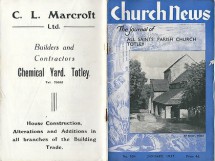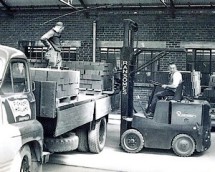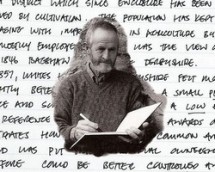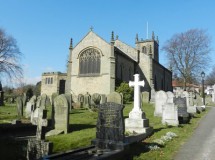Cymbert Ellison
Letter A.
Cymbert Ellison to his mother, Constance.
One page. Undated. Said to be written about 1900 when Cymbert Ellison was about 11 years old.
Drawings of Thecla (his sister), a cat and Alban (his brother)
Dear Mother
How do you like these photos of your children. I had my favourite pudding yesterday which was very soon gone. Thank Thecla for her card and don't let her get too excited. Louie and I beat Charley Win
and Elfrida at hockey yesterday. Good bye Mother, give my love to the children.
Love from
Cymbert Ellison
Cymbert Ellison Letter A.pdf
Adobe Acrobat document [387.4 KB]
Letter B.
Cymbert Ellison to his sisters, Thecla and Elfrida
Four pages. Dated 1 February 1915
[page 1]
9.15 a. Feb 1st - 15
"S.S. Minneapolis"
Atlantic Transport Coy
My Dear Thecla and Elfrida,
I am writing to thank you for your letters as I expect this will be the last chance I shall have until I arrive in New York. The pilot is going ashore at Dover and I was informed this morning at
breakfast that if I had any letters for the post, he would take them on account of the bad fog which came up last night, we were unable to leave the Thames & had to anchor all night, We are now
only just steering into the channel & I guess she is going to give me a devil of a time when we get into the Atlantic, at least I can not tell yet, but I am, of course, hoping for the
best - you know, I should like to starve those fishes. I think they have plenty of food without
[page 2]
taking any of mine! What ho! She begins to rock! The captain, who seems a fairly decent sort, has given orders that the aerial has not to be hoisted until we leave the channel. I do not believe there
will be much work even then. The press seems to be about the most important thing, a page of which has to be taken every day & three copies typed - fancy me taking press! (we are moving well
now!) I hope there will not be any more fog for it cannot be so pleasant to be anchored in the open. I am glad to say that both our rooms are very comfortable and warm, being heated by steam
radiators, in fact I got so hot last night that I was compelled to throw off some clothing. I have not yet seen many passengers on board but I think we shall probably pick some up at
Southampton. The grub is very good, dinner at night, & cup of tea when called in the morning, so I guess we are not going to fare so badly but, of course, she is a very fine ship & all are
not by any means as good.
[page 3]
I am wondering how I shall get on with the work for there seem to be several accounts ... etc. which I know nothing whatever about, however it may not be so hard when once I get into the 'swing' of
things - sounds rather a good word! I think under the conditions I am at present. It is going to be a nice day, I guess. The sun has just come out & I hope it will stop out.
Elfrida seems to have had a bad time with old Webster's substitute but she just as might ought to have seen the old boy I went to. He was no less than 70 years of age, with red wolfy eyes & a horribly shaky hand. He kept letting his drilling machine run into my gum, in fact all over the place, and then cursing me for not holding my lip back, as if it was possible. The funny part was that he could not even see the teeth I wanted stopping although I had pointed them out to him before - what he has filled, I have not the least idea. I will close now.
With fondest love
I am your affectionate brother
Cym
[page 4]
P.S. Isn't it wonderful. I am still feeling very fit, Shortly we go down for boats drill which they appear to have on this ship. Life saving business, I believe it consists of, in case the
Germans should blow us up, you know!! I was thinking about the nasty devils last night but was too tired to think long.
In room. Still feeling fit.
Cymbert Ellison Letter B.pdf
Adobe Acrobat document [2.7 MB]
Letter E.
Cymbert Ellison to his mother, Constance
One page. Dated 30 March 1915
S.S. Crown Point
Philadelphia
March 30th
Dear Mother,
Just a few lines to tell you we arrived here safely on Saturday night, March 27th. I am sending you a cutting from the "Philadelphia Record" to give you an idea of the exciting time we have had and
to explain for our delay in getting here. The cat. is one of the best & we have had some real good sport with him during the voyage. He was very pleased with the work we did in connection with
the "Vedamore". Philadelphia is certainly 'some' place. I must close now in order to catch the mail. Trusting you are all quite well at home.
Ever your affectionate son
Cym
P.S. We will probably be leaving here next Saturday
Cymbert Ellison Letter E.pdf
Adobe Acrobat document [1.3 MB]
Letter F.
Cymbert Ellison to his mother, Constance,
Four pages. Dated 30 May (1915).
[page 1]
S.S. "Matoppo"
Ellerman & Bucknall S.S. Co.
Dear Mother,
As we are expecting to arrive New York in a few days time, I am commencing this letter in the hopes of giving you some slight impression of my rather uninteresting & uneventful voyage. The weather has been cold & wet & we have had several stormy days with a strong gale blowing from the west. The heavy seas have somewhat delayed our progress & the ship has been rolling badly all the way. There has been a considerable change however during the last few days, which have been a great deal milder. This might be accounted for by the Gulf Stream! I was mistaken when I told you that we were loading cargo in Manchester for I discovered later that we were sailing to New York as a light ship & it is there, she is loading for New Zealand. I seems like months already that I left old England & it was only yesterday that I was able to get some war news from another ship, I also received something
[page 2]
about the train smash near Carlisle which appears to have been rather serious from the number given as killed & wounded but I do not suppose it will be considered as much in time of war, although
the loss must actually be of greater importance. So far I have not had any telegrams to send, nor any to receive, bar ice reports, but the skipper was telling me the other day that he wanted to send
one as soon as I got in touch with land. I am glad to say the accommodation on this ship is greatly superior to that of the 'Crown Point' & my black boy "Hafnon" seems to look after me fairly
well. I am glad that I brought my violin. I have found it to be very consoling during my lonely hours. The Berlin puzzle is no longer any use to me as I can now get the bullet there and back without
any trouble. Sometimes in the evening I have a few rounds at boxing, or else requested to play my violin in the 4th engineer's room, where we can always get some very harmonious singing & I am
rather sorry that I did not bring more music with me. The capt., though of German decent, has not turned out to be as bad as I thought. I cannot say that the officers are quite such a nice lot as
those on the "Crown Point" but maybe. I have hardly known them long enough to express an opinion
[page 3]
Today I have had some excellent work!! I have been shovelling soil overboard from the lower aft deck. There is altogether about 200 tons of this stuff, which we took on board in Manchester for
ballast but now that we have not much further to go, it is no longer needed & the deck has to be cleared before we arrive at New York. The capt. seemed very pleased at finding me so well engaged
& it was not long before he came & had a turn himself. It has been a lovely day & I think the exercise has done me good. I could almost imagine that I was getting sand with the old
Corvett. I have not had any clothes washed yet but I think I will be able to get a lot of things, socks etc. done on board a ship. I dare say that you will be glad to know that I am able to get a
fairly respectable bath with a bucket of hot water, when ever I wish. I have taken a few photographs already, of the ship and one or two portraits which I shall probably get developed in New York. As
I do not think I have anything more of interest to tell you, I will now close. Trusting you, father & the girls are all quite well. I am Your Affec. Son. Cym
[page 4]
Sunday. May 30th
P.S. From what I understand, we shall be staying in New York for about two weeks but this would hardly give you time to send me a letter there, in reply to this. Anyhow I will send you a card or
something when I know definitely where we are sailing to from there. We expect to arrive N. York at some early hour tomorrow morning. This has been just a terrible long voyage & I shall not be
sorry when I can stretch my legs ashore, "id est terra firma". I received news from South Wellfleet last night, saying Italy , at last, joined in the fray & that her armies were 16 miles from
Trieste. I guess the war will soon be over now! It is a most glorious day & the sea is as calm as a lake. I can hear all the yankie stations wkg. away for all they are worth & now I will
close. Best love to all. Cym.
May 31st.
Weather terribly hot. General holiday in N. York & all the place is decorated with flags. Have been for a stroll up 3rd Av. this morning. Not yet read any letters.
[page 1 margin]
June 1st. Tuesday
I have just received your letter, & also one from Thecla for which I thank you both very very much. The weather is holding hot but I am feeling fairly fit. I spent yesterday afternoon and evening
down at Coney Island. It is certainly a wonderful sight. "White City" on large scale sort of thing,. 54,000 people there yesterday. Fondest love to all
Link to S.S. Matoppo on Clydesite.co.uk
Link to Quintinshill Rail Disaster, 22 May 1915 on Wikipedia
Cymbert Ellison Letter F.pdf
Adobe Acrobat document [3.2 MB]
Letter C.
Cymbert Ellison to his mother, Constance
Eight pages. Pages 1-4 are absent. Dated 8 February 1916
With envelope. Post marked Cape Town 16 February 1916
UNION-CASTLE LINE
S.S "DURHAM CASTLE"
[page 5]
8/2/16
We occasionally get a strawberry one at 11 o'clock. Lunch is served at 1, cup of tea and cake at 4, and dinner at 7, so I cannot say we really do so badly. Do you think I shall ever sail on a cargo boat again? Not if I know it! When I come off duty at 9 P M, I spend about another 2 hours on the lower deck so that all the sleep I am able to get only amounts to about 4 hours out of 24. However since we have been out of the war zone
[page 6]
and up to the day before yesterday we did not keep a continuous watch as the captain said it's not necessary, which I think was very considerate of him, so that instead of doing 12 hours out of 24 we
were only doing 5 each. Therefore, during the period of about 1 week, my watch was from 5 to 8 am, 12 to 1 am and 5 to 6 pm. This arrangement I found, of course, very agreeable, it allowing us an
easy time during the hot weather & I am hoping rather that we get the same coming home. To return to the topic on passengers, I should say about 50 per cent of them are soldiers who
are
[page 7]
going out to 'German East Africa'. Some of the officers are very nice chaps, but the colonel, a man called 'French' is (if I may use the expression) one of the best. Although I have had but very few
words with him, there is just something about his manner which is so extremely nice or attractive, that I could not properly define, except that he is an Irishman which accounts for a lot. There is
another young colonel called 'Christie' with a stiff leg, who is invariably flirting with a married woman. Her daughter, a very pretty but decidedly spoilt kiddie of 6, was telling me in confidence
the other day that her 'Mamie' was on the stage which anyone knowing her I think could very well believe - people on board this ship seem to be by no means reserved. It is, in fact, absolutely
surprising the easy way in which
[page 8]
some of them carry on. The dancing which they have almost every night on deck is quite good sport to watch and the other night both the 1st and 3rd class passengers had a concert which was very well
got up, although of the two I thought the 3rd a great deal more amusing, if not better than the first. The ladies and gentleman's sports are just about over but they were also very good. Tomorrow we
are expecting to arrive C. Town. I do not think I have any more news to tell you & so 'Au Revoir' mother dear.
My Fondest love to all,
Your Affectionate Son
Cym
P.S.
I expect you will receive this letter in time to post another to 'Madiera' but I think you will better able to judge than I!!
Cymbert Ellison Letter C.pdf
Adobe Acrobat document [1.2 MB]
Letter G.
Cymbert Ellison to his mother, Constance.
One page dated 27 May (1916)
May 27th 6 pm.
Please write to
C. E. Ellison W.T.O
C I. Mess,
Royal Naval Barracks
Chatham
Dearest Mother,
Arrived here this afternoon at 2. I cannot say exactly when I shall be leaving but as it is a particularly interesting place I do not much mind. Everyone seems exceptionally good humoured & obliging. I have just had tea consisting of water-cress and shrimps. I am now free to go where I like until Monday morning but I am returning to the Barracks tonight as I wish to have the experience of sleeping in a hammock. Have not yet met any other opr. as they all seem to be away on leave. Expect to get my uniform sometime next week. Will write again soon. The Barracks are simply enormous covering many acres of ground. Some of the buildings are very pretty..
Fond love to all. Your Affec. Son
Cym
Cymbert Ellison Letter G.pdf
Adobe Acrobat document [592.7 KB]
Letter I.
Cymbert Ellison to his mother, Constance.
Two pages. Undated.
[page 1]
Tuesday
W. T. O. Ellison
C I Mess
R.N. Barracks
Chatham
Dearest Mother,
I was rather disappointed that I did not get a letter from home this morning but I expect you will be writing soon. I do not suppose I shall be leaving here this week as it was only yesterday that I
had to be vaccinated. I had the pleasure of standing outside the office for 4 hours which you may be sure I greatly resented & now I suppose it will not be very long before I have a beautiful raw
arm. I am expecting to get part of my uniform tomorrow. The discipline is rather stiff up here but on the other hand the living is often worse at sea. I have lately
[page 2]
made the acquaintance of two wireless men who have just come in from their ship which was torpedoed the other day. Everybody seems to have a few cheerful stories to tell but before I close this
letter I should like to know when you & the girls are thinking of going to see Uncle Talton. I was wondering if you would care to start your journey now & spend a few days in "Chatham" before
you went on to your destination. I have every other evening off & every other week and although the next is not mine off. However I am particularly anxious to see someone as I am almost certain I
can get no leave. I have forgotten Alban's address. Kindly send him mine as soon as possible. I should be delighted to see him if only he could get away. "Southamton" (Southampton) cannot be far from
here!. I wonder how he is fixed! Please write as soon as you can.
Fondest love to all
Your Affec. Son
Cym
Cymbert Ellison Letter I.pdf
Adobe Acrobat document [1'020.7 KB]
Letter H.
Cymbert Ellison to his mother, Constance
Undated. 5 pages
[page 1]
Thursday
Please address your correspondence as follows:- Name of Ship, c/o G.P.O. London
Dearest Mother,
I am just beginning to realize what sort of a life a man is expected to endure in the navy & from what I have so far experienced I should say that the life of a dog is not in it, when compared
with the luxurious living which we get on board this wretched mine sweeper !!! We left "P. Glasgow" last Saturday with the intention of sailing round by the North of Scotland to "Granton" which from
all accounts is to be our base. However, on arriving somewhere near there on Monday morning we were ordered out to sea to go sweeping with one of the other boats & we have been out ever since. We
expect to go into "Granton" tomorrow morning
[page 2]
For the last three days all the men on board have been short of grub for naturally we had only taken sufficient provisions to last us for the week-end thinking that we should be arriving in port
sometime on Monday. Fortunately we have been lying at anchor each night off a small Island were (where) some of the crew were able to obtain a few eggs and some potatoes but I do think it is
absolutely scandalous to keep these poor chaps without food & expect them to do their work. I am quite certain that there were many who could not get so much as a bite of bread during the whole
of one day and then of course what we were able to get from the Island was only what the people there could spare The sole inhabitants consisting of five families "the men of whom were employed on
the lighthouse etc." were only supplied with provisions every two weeks.
[page 3]
On Tuesday evening one of the men off the Island was kind enough to catch us some fish which I am sure was greatly appreciated by everyone. I myself was not so badly off as I had taken the precaution
to buy myself a good supply of porridge. I had also a few eggs although the one which I had this morning was becoming a trifle lively. I must tell you that before leaving port "Glasgow" the two men
with whom I am now messing found that the steward who had been catering for us was not acting altogether straight & and so whilst I was away on leave they had come to the conclusion that it was
better to buy their own provisions. When I returned I considered it was my best plan therefore to put my allowance of 10/- per week in together with theirs but I am thinking after this that I shall
mess entirely on my own although of course it may be slightly
[page 4]
more expensive and there may be also serious complications about getting things cooked. However everything is in such a rotten condition that I have quite decided not to worry anymore. I have been
seasick for three days so that I have not required so much food as I should have done under other circumstances. The weather has been better today & I fancy that I am becoming more or less
hardened to the job (resigned is perhaps a better word). I am sitting now with my life belt around my breast. Another boat has kindly bumped up against us and has made a mess of our bows where she is
already beginning to leak. I expect this will mean a few days in dry dock. Do not forget to let me know when you are returning home as I would like you to send me a piece of bacon or a Round of Beef
and I am wanting also a small pillow to put in my hammock
pls turn over
[page 5]
I received a card from Thecla & Elfrida but have not got any letter since the one you posted to me some time ago. I am hoping there will be one when we arrive in port. As we have not yet received
any money of any kind (allowance for victory or pay) except £1 which was paid some weeks ago as an advancement. I should be glad if you could spare me a few pounds. When I was at home last, father
gave me three pounds which is, of course, gradually dwindling away.
I must now close this long epistle as I think there is nothing much more to tel you just now.
Trusting you are all quite well & that the change is doing you good. I am
Ever Your Loving Son
Cymbert
P.S. Give my love to the girls and tell them to be good.
Friday night - just received your letter dated 29th. Many thanks.
We are now in dry dock at Leith, 1 mile from Granton.
Cymbert Ellison Letter H.pdf
Adobe Acrobat document [3.6 MB]
Letter D.
Cymbert Ellison to his mother, Constance.
Six pages. Dated 30 July 1916
[page 1]
H.M.S. Kempton
30th 7. 16
Dearest Mother,
We have now been out sweeping in the north sea for four days & four nights but have not yet been so fortunate or unfortunate as to even see anything in the shape of a mine. I am very much hoping
that we will soon return to Granton as I am rather in need of getting a good sleep, you see, there is only just myself & another chap keeping W/T guard & of course I have never been
accustomed to keeping the four & four watch (i,e, four on & four off) needless to say we are compelled to adopt these hours on account of getting called with the other men ( when asleep)
& also to fit in with the meals!
[page 2]
We are usually pretty busy and get plenty of messages, all of which we have to code or decode ourselves. This is by no means a swift job, although I am becoming slightly more experienced in it now.
The messing part of this performance I think, is just about the worst arrangements I have ever known & seems to put one to no end of worry & trouble although of course, like everything else,
it is just typical of the navy. It is one of their chief factors to make everything as complicated as they can!! At the present time I am messing partly on my own & partly with the other two
animals belonging to my mess. I am beginning to wonder if I am still a human being myself, at least, I am sure that I am no longer civilized. I cannot say that I have made many friends
aboard
[page 3]
for the simple reason that I am down on my luck & I do not understand them & they perhaps do not understand me but some of the nicest men on board are the old fishermen. They at least have a
warm heart, but as for the others I cannot say much, I only know that most of them hate me like poison, why it is I cannot tell & I feel quite guiltless of ever having injured their delicate
feelings! I suppose I have been brought up in a different way to them! but you will understand best what I mean. I am afraid this is a queer sort of letter but it is no use me writing a lot of lies
& saying that I am having such a lovely time on board this old mine sweeper. I should like to know who could but after all it is war time & I do not suppose anyone with reason could quite
anticipate a picnic. However it is not the life I mind so much as the extreme loneliness then again I am so utterly wretched
[page 4]
because I am no longer able to see my wife and baby girl, so that on this account I have decided to have them up in Granton, where at least I shall be able to see them sometimes. I thought it would
be best to tell you, but I should like you to remember mother please, before you say it is foolish, that it is the only thing which can make me happy. I have been at a lot of trouble to find some
suitable rooms although I did find a country house being the first which I tryed in Granton, that would have suited me down to the ground with the most moderate terms that one could ever expect. They
were such a nice family & I made all arrangements, & then a few days later the lady was taken ill & I had to give it up, since then I have had no luck.
[page 5]
I have found another place now but it is not nearly so good. Anyway I expect we shall be able to manage somehow. I do wish this war was only at and end but there seems to be no hopes. I am anxious to
know if father made any inquiries when he was in London about getting me a warrant! I do wish he could. How is Alban getting on now? I have sent a lot of my dirty clothes to a laundry in Granton,
which I am hoping to get back when we arrive in port. We are still getting paid in a very irregular way. I shall be glad if you could send me some more money. It seems a long time since I heard from
home!
Trusting you are all quite well
My fondest love to all
Ever your affec. son
Cym
PS please write soon
Please turn over
[page 6]
P.S. Granton Harbour 1-8-16
I have received your parcel containing pressed beef & Benco [?] & I thank you very much. I regret to say that it is already nearly finished. In all probability we are going out again on Sunday or Monday & I am hoping you will write to me again before then. Will you please send me Alban's address. I should like to know how he is getting on.
Love to all
Cym
Cymbert Ellison Letter D.pdf
Adobe Acrobat document [3.5 MB]
Search Our Website Here
September
October
November
Unless stated otherwise our meetings are held in Totley Library on the 4th Wednesday of each month at 7.30pm.
Pauline Burnett's book The Rise of Totley Rise has been revised and updated. It tells the story of this small piece of land from 1875 when there was only a rolling mill and chemical yard alongside the river a mile from Totley, through Victorian and Edwardian times, two world wars and up to the present day. It has 94 pages including a useful index and many illustrations from private collections. The book is available now from Totley Rise Post Office priced at £5, or through our website when an additional charge will be made to cover packing and postage.
A few copies are still available of Sally Goldsmith's book Thirteen Acres: John Ruskin and the Totley Communists. Totley was the site of a utopian scheme funded by art critic and social reformer John Ruskin. In 1877 he bought 13-acre St. George’s Farm so that nine Sheffield working men and their families could work the land and, to keep themselves busy, make boots and shoes. Sally tells an engaging story from our history with a quirky cast of characters including Ruskin himself, the poet and gay rights activist Edward Carpenter and Henry Swan, a cycling, vegetarian artist and Quaker. The book is available to order online from the The Guild of St. George by following this link.
A recently discovered box of WWII correspondence reveals the story of how a small group of ladies from Dore and Totley recruited knitters from the west of Sheffield and how their efforts made them the country's greatest provider of Comforts for the Minesweeping crews of the Royal Navy. The story is told in Knit For Victory, a new book from Totley History Group. Written by Pauline Burnett, it has 82 pages and many illustrations. It is on sale in local shops and via our website. Further information about the correspondence is in this inside page of our website: Dore & Totley Minesweeping Trawlers Comforts Fund.
The story is told in Totley War Memorial WW1 of the ten men from our village who gave their lives in the Great War. Written by Pauline Burnett, Jim Martin and Dorothy Prosser, a chapter is devoted to each of the soldiers with a family tree followed by as much information as could be discovered about the men and their families. There is also information about their military careers and the actions in which they lost their lives. The book has 64 pages and is illustrated throughout with photographs of the men, their families and the houses where they lived.
Totley All Saints' Church Parish Magazines for the years 1985-2006 with notices of baptisms, marriages and funerals and accounts of spiritual, educational, charitable and social matters in the village. Scanned in full, including advertisements from local traders.
In 1893 during the building of the Totley Tunnel there was an outbreak of smallpox amongst the navvies which spread to some of the local population. 17 people were buried in communal graves in Dore Churchyard, 6 from "Green Oak" (Lemont Road). The severity of the outbreak was principally caused by overcrowding and insanitary conditions in lodging houses .
Kathleen Grayson was a 39 year old housewife when WW2 broke out. She volunteered for the ARP and became an ambulance driver. During an air raid on Sheffield in July 1941, and despite her own injuries, she managed to get a seriously injured casualty to hospital. For this she was awarded a commendation from King George VI. Together with her friend Hilda Duffy, Kathleen also assembled a team of knitters to provide essential warm clothing for the men serving on the minesweepers patrolling the North Sea.
We have recently bought at auction the WW2 memorabilia of Douglas Platts whose family home was at Hillside, 98 Queen Victoria Road. After the war Douglas returned to his civilian occupation working in the family scissors manufacturing business. He lived in our area for the rest of his life.
We are very grateful to Mrs Valerie Taylor of Dore for lending us the title deeds to Lower Bents Farmhouse which is reputed to be the oldest surviving building in the area with a proven history back to 1621. We have now scanned and transcribed the deeds which could be particularly interesting to anyone with a connection to the local Fisher, Dalton and Marshall Families.
Until 1844, when Dore Christ Church parish was created, Totley township was part of Dronfield parish. We have now transcribed the burial records for former Totley residents at St. John the Baptist, Dronfield for the period 1678-1870 and at St. Swithin, Holmesfield for the period 1766-1901.
Whilst researching the history of the Dalton Family we found it useful to transcribe a number of early Wills and Inventories. These and those of many other Totley, Dore and Holmesfield people dating from between 1594 and 1856 have now been added to our website.
St. Swithin's Church, Holmesfield pre-dates Dore Christ Church and was the place where many of the people from Totley worshipped and were baptised, married and buried. Read the inscriptions on more than 750 gravestones in the churchyard including those of Mr. and Mrs. William Aldam Milner of Totley Hall, Jessie Matilda Tyzack (nee Fisher) of Avenue Farm, and Rev. J. A. Kerfoot of St. John's, Abbeydale.
Thomas Youdan was a music hall proprietor and benefactor who was living at Grove House, Totley in 1867 when he sponsored the first football knockout competition in the world for The Youdan Cup.
The words Millhouses Cricket Club can be seen in the background of team photos which are likely to date from between 1905 and the early 1920s, very probably pre-war. They were lent to us by Garth Inman who can identify his great uncle, Cecil Inman, in some of the photos and would like to know when they were taken and, if possible, the names of others present. Please take a look to see whether you can put names to any of the faces.
Josiah Hibberd was seriously injured whilst working on the construction of the Totley Tunnel in 1892. He died on 9 May 1897 at the age of 38 having apparently spent most of previous five years in hospital.
Bradway House was built around 1832 by Henry Greaves, a farmer, together with two adjacent cottages. We have traced most of the occupants of the property from these early days up to the start of World War Two.
We have transcribed the baptisms records at St. John the Evangelist, Abbeydale from when the church was consecrated in 1876 until just after the start of World War 1. The records are arranged in alphabetical order based upon the child's name and show the date of baptism, the names of the parents, their home location and occupation.
Nick Kuhn bought an original 1920s poster which had this owners' blind stamp in one corner. The stamp almost certainly refers to a house named Wigmore that was built in the late 1920s or early 1930s. The first occupiers that we can trace are John Howarth Caine, a district mineral agent for the LNER, his wife Florence Jane (nee Prince) and daughter Doris Mary. The Caine family lived at Wigmore until 1936 by which time the house would have been known simply as 12 The Quandrant.
George Griffiths died on 13 December 1888 following an explosion during the sinking of number 3 airshaft at Totley Bents. His widow Florence died shortly afterwards and his two daughters Maud and Annie were adopted separately. Whilst Annie lived the rest of her life in Yorkshire, Maud emigrated to Australia in 1923 with her husband, John Burrows, daughter Margaret and son Jack, pictured above.
George Wainwright was said to have been born in Bamford, Derbyshire in 1714. He learned the trade of linen weaving and moved to Totley after his marriage on 1744. He became an ardent follower of John Wesley who paid many visits to Sheffield and who would have passed through or close to Totley. Preaching was at first conducted out of doors and when Wesley's preachers became harassed by a mob of Totley ruffians in 1760, George offered them safety of his own home. He remained a Methodist for all of his long life, dying in Dore in 1821 at the reputed age of 107.
Oakwood School was started by Mrs Phoebe Holroyd in 1925 initially as the Firth Park Kindergarten and, by 1927, as the Firth Park Preparatory School. Phoebe was still working at the school almost fifty years later when she was well into her seventies. We would like to hear from anyone with memories of the school.
James Curtis was born at sea aboard HMS Chichester in 1790. He enlisted as a Private in the 1st Grenadier Regiment of Foot Guards in Sheffield in 1812 and served in Spain and Portugal during the Peninsular War. He later fought in France and Belgium taking part in the Battle of Waterloo. In later life James lived at the Cricket Inn where his son-in-law William Anthony was the licensed victualler. He died in Heeley in 1882 aged about 91.
Charles Paul lived in Totley in later life. He was a local historian and archaeologist who was an authority on the history of Sheffield, especially the two areas he knew best: Attercliffe and Ecclesall. His books and letters to local newspapers were published under the Latin form of his name Carolus Paulus.
Towards the end of the 19th century Totley Hall gardens became a well known beauty spot that attracted many hundreds of visitors from Sheffield on open days and the rock gardens became one of its most popular features. Mrs Annie Charlesworth sent us six glass transparencies of the rock gardens taken, we believe, in the early years following the Great War.
Anton Rodgers send us photographs of three water-colours that had been bought by his grandfather at a sale of the contents of Abbeydale Hall in 1919. One was of a scene said to be in York by A. Wilson. A second was of a seated child with a dog believed to be pianted by Juliana Russell (1841-1898). The third was of Lake Como, by Ainslie Hodson Bean (1851-1918) who lived for much of his life on the Riviera and in North Italy.
A Canadian correspondent sent us photographs of a set of silver spoons that were bought in a small town in British Columbia. The case contained a note signed by Ebenezer Hall indicating that they were a wedding gift to Maurice and Fanny Housley. We think we may have traced how they got to Canada and where they might have been since.
Green Oak Park was opened on 23 March 1929 on land that had been bought by Norton District Council from John Thomas Carr, a farmer and smallholder of Mona Villas. In later years, the buildings were used by the Bowling Club (the green having been built in 1956) and by the park keeper. However, the buildings appear to have been constructed in several phases, the oldest of which predates the park to the time when the land was used for pasture.
We believe the old Totley Police Station at 331 Baslow Road was built around 1882. Two lock-up cells were excavated just below floor level in the summer of 1890. We have traced the Derbyshire Constabulary police officers who lived there from John Burford in 1886 to George Thomas Wood who was there when Totley was absorbed into Sheffield in 1934.
David Stanley lived in Totley Rise in the later years of his life. Born in Bulwell, Nottinghamshire, he joined the 17th Lancers when he was 19 and rode in the Charge of The Light Brigade at the Battle of Balaclava where he was seriously wounded. For the first reunion of veterans in 1875, he told his story to a reporter from the Buxton Herald.
This picture postcard was addressed to Miss Abell, Holly Dene, Totley Brook Road and posted in Rotherham on 10 December 1907. Edith Annie Abell was born on 4 February 1887 in Sheffield and her family came to live in our area in the 1900s, staying for the rest of their lives.
Charles Herbert Nunn enlisted in the British Army on 23 August 1915 and was sent to France on 18 December 1915 to served with the British Expeditionary Force. In March 1916 it was discovered that he was underage and he was returned home. Shortly after his 18th birthday he re-enlisted and was again posted abroad where, in addition to this trio of medals, he was awarded the Military Medal.
This certificate was awarded jointly by the Red Cross and St. John's Ambulance to Isaac Henry Williams, of Lemont Road, for his services during WW1 as a stretcher bearer. We are seeking anyone who can help us pass it on to a living relative.
In 1832 Samuel Dean pleaded guilty to stealing a quantity of lead from the Totley Rolling Mill and was sentenced to seven years transportation to Australia. He sailed on the Mangles and upon arrival in New South Wales he was sent to work for William Cox, the famous English explorer and pioneer. After receiving his Certificate of Freedom in 1840, Samuel became a farmer and went on to have a very large family. Samuel was born in Whitechapel around 1811 to parents Samuel Dean Snr. and Susannah Duck. His descendant Sarah Dean would like help in tracing his ancestry.
Ellen Topham was born in 1889 in Nottingham. Her parents had been living together since 1862 but had never married so it was most unusual that, after their deaths, Ellen was accepted into Cherrytree Orphanage. Even more so since her father, Snowden Topham, had been acquitted somewhat unexpectedly in a widely reported manslaughter trial. Ellen remained at Cherrytree until her death from pulmonary tuberculosis at the age of 15.
Mabel Wilkes was a resident in Cherrytree Orphanage between 1897 and 1905. Her granddaughter Sally Knights sent us these images of a book presented to Mabel as a prize for her writing. Sally also sent us some personal memories of her grandmother and a photograph of a locket which contains portraits of Mabel and her husband Septimus Gale.
John Henry Manby Keighley was living at Avenue Farm when he enlisted in 1916. He fought in France with the Cheshire Regiment but after home leave in early 1918 he went missing. The Army were unable to determine whether he had deserted or returned to the front and been either killed or captured by the enemy. In August 1919 he was formally presumed killed in action but it appears he did not die but returned home to his family.
Horace Ford was admitted to Cherrytree Orphanage on 26 October 1888 at the age of six. He left at the age of 14 to become an apprentice blacksmith and farrier. Soon after his 18th birthday Horace enlisted in the Imperial Yeomanry to serve his country in the war in South Africa. His letter home to his Orphanage mentor tells of the lucky escape he had in battle.
Pat Skidmore (née Sampy) lived on Totley Brook Road from 1932 to 1948 before her family moved to Main Avenue. In this short article she remembers her time at Totley All Saints School where she was a contemporary of Eric Renshaw and Bob Carr.
As we have nowhere to exhibit memorabilia and artifacts, we have created a Virtual Museum instead. The latest addition to our collection is this double-sided Totley Rise Post Office oval illuminated sign which was on the wall of 67 Baslow Road before the Post Office business transferred to number 71. Please contact us by email if you have things that you own and would like to see added to the virtual museum.
Conway Plumbe was a man of many talents who came to live in Totley Rise around 1912. As a young man he had poems published by Punch magazine and is remembered in modern collections of WW1 poetry. A number of his paintings were accepted by the Royal Academy. An engineering graduate of London University, he joined the Civil Service where he rose to a high level as a factory inspector, publishing two books on the subject and giving a series of talks on workplace health and safety on BBC radio during WW2. In retirement he wrote a philosophical-spiritual work called Release From Time.
Inside Totley Rise Methodist Church there is a Roll of Honour commemorating the soldiers from its congregation who served their king and country during the Great War. For all but one of the 28 names the soldier's regiment is recorded in the next column. The exception is David Cockshott for whom 'killed in action' is written alongside yet he appears on no war memorial in our area and no record of a mortally wounded soldier of that name is to be found. We think we have solved the mystery.
Mrs. Kate Plumbe moved from Mansfield to Totley Rise with a number of her family in 1913 and became closely involved with the Totley Union Church. Her daughter Winifred became a missionary and headmistress in Calcutta for over 38 years following which she returned home to live with her sister Hilda on Furniss Avenue. Hilda had also been a teacher, missionary and, like her mother, a volunteer at St. John's VAD during WW1.
Thomas Glossop was a cutler and razor manufacturer who was well known amongst cricketing and gardening circles. Despite going blind, he was able to continue his hobbies with remarkable success
The Totley Union Cycling Society Prize Giving and Fete was held on the fields near Abbeydale Hall on 18 July 1914. Anne Rafferty and Gordon Wainwright have named some of the people in two wonderful photographs of the event. Can you identify any more for us?
The Tyzack family are well known in our area for owning iron and steel trades at Walk Mill, Abbeydale Works, Totley Rolling Mill and Totley Forge. This article covers the history of the family from the late 18th century when William Tyzack the founder of the company was born until the early 20th century when Joshua Tyzack farmed at Avenue Farm, Dore.
Walter Waller Marrison moved to Totley around 1897 with his wife and their two young sons. He was a house builder who constructed properties around Totley Brook and Greenoak before ill health forced him to take up less physically demanding work. In 1904 he took over the tenancy of the grocers and off licence at number 71 Baslow Road. After his death in 1908, his widow Kate and later their eldest son Jack continued to run the business until it was sold in 1934.
Ron Wijk of Nieuw-Vennep in the Netherlands has sent us two scanned images of drawings of old cottages made by the celebrated Dutch painter, Anton Pieck (1895-1987) simply annotated "Totley", and wondered whether we could identify their locations.
We would like to thank Christopher Rodgers for bringing to our attention this fascinating log of the 85th Sheffield (St. John's and Totley Orphanage) Wolf Cub Pack for 1927-45. The log is published jointly by Sheffield Scout Archives and Totley History Group as a free PDF download. It is illustrated by no fewer than 92 photographs and is supported by a comprehensive index and biographies of some of the main participants.
Following our Open Meeting event on School Days, Roger Hart, Howard Adams and John Timperley have each written to us with their memories of Norwood School, which was located in the rooms attached to the Dore & Totley United Reformed Church on Totley Brook Road.
On 22nd July 1909 the children of Dore and Totley Schools celebrated by a pageant the union of England under King Ecgbert which took place at Dore in AD 827. The pageant was devised and written by Mrs Sarah Milner and her daughter Marjorie and performed in a field close to Avenue Farm in front of a large audience. Photographs of the event survive together with a fragment of the script.
John Edward Greenwood Pinder had lived all 46 years of his life in Totley but on census night, Sunday 2 April 1911, he was not at home; he was in Derby Gaol serving a sentence of three months hard labour. From the age of 20, John had been in and out of local courts for a series of minor offences including drunkenness, assault, wilful damage and night poaching. Finally he was sent to gaol for cutting down and stealing 86 small trees which he sold in Sheffield market for Christmas.
We have already transcribed the census returns for Totley, Totley Rise and Dore. Now we have transcribed Census Strays. These are people who were born in Totley but are missing from our earlier transcriptions. They may have been living, working or studying elsewhere or just away from home on the night the census was taken. Two people were in prison. Others were in Union Workhouses, hospitals and asylums. Fully indexed strays from the 1851, 1861, 1881, 1891, 1901 and 1911 censuses are available now.
We wish to thank Gillian Walker for allowing us to digitize an archive of material about the 1st Totley Scout Group. Most of the material was collected by Arthur Percival Birley in the period 1949-51 and there are many interesting documents pertaining to the building of the scout hut on Totley Hall Lane. In addition four Newsletters survive, two from the 1940s and two from 1971.
We are grateful to Angela Waite and All Saints' Parish Church for giving us access to baptismal and kindergarten birthday rolls dating from 1926 to 1941. We have transcribed the names, addresses, birthdates and baptismal dates and created an alphabetical index of entries for you to search.
Edmund Sanderson, a Sheffield estate agent, aquired the land on either side of the old drive to Totley Grove in 1874 and divided it into plots for development. He called it the Totley Brook Estate. But before many houses were built, the estate road was severed in two by the building of the Dore & Chinley Railway line. The eastern end of the road became the cul-de-sac we now call Grove Road.
John Roberts was born in Sheffield in 1798. He became a partner in one of the leading silversmiths firms in the city before moving to Abbeydale Park in 1851 and extending the house in Victorian gothic style. He paid for the building of St. John's Church and was believed to dispense more in charity than any other person in the neighbourhood including his protege Ebenezer Hall.
The Coke Family owned the Totley Hall Estate from 1791 to 1881. With the aid of a family tree to guide us, Josie Dunsmore takes us through the story of their tenure.
When the Rev. D'Ewes Coke inherited the Totley Hall Estate in 1791 it had two farms. Josie Dunsmore tells the story of how the two farms were combined under the tenancy of Peter Flint with the aid of field maps drawn by Flint himself and later by the Fairbanks family.
Do you think you recognize this face? More than sixty photographs of the girls and teachers at Hurlfield Grammar School for Girls in the 1940s were given to Totley History Group by Avril Critchley, who was herself a student at the school. The collection includes fifteen form photographs from June 1949. There would have been a number of girls from the Totley area attending the school in those days.
Christine Weaving tells the story of her 2 x great uncle George Edward Hukin, a Totley razor-grinder, and his life-long friendship with the academic, poet, writer, and free-thinker Edward Carpenter.
Eric Renshaw (pictured here on the right with Bob Carr) grew up and lived in Totley from 1932 to 1960. Many of his memories are of a sporting nature.
We are very grateful to Gordon Grayson for giving us this splendid sale document for the Norton Hall Estates, following the death in 1850 of Samuel Shore. The estates included a large part of Totley and the document has maps and illustrations, plus schedules of land and property with the names of tenants. We have also added a transcription of the entries for Totley and Dore.
Watch this Youtube video of the talk given by Dr. Mark Frost and Sally Goldsmith on Ruskin, Totley and St. George's Farm. The talk was hosted by Totley History Group on 20th May 2015 as part of the Ruskin in Sheffield programme. Also enjoy a video of the outdoor performance Boots, Fresh Air & Ginger Beer written by Sally.
When Jacqueline A. Gibbons became interested in what made her father tick, it began a journey through WW1 archive records and led to her flying from Toronto to visit the house and village where he lived and the countryside that he so much enjoyed. Jacqueline reminds us that in the early 20th century Sheffield was a driving force of industry and that Totley was the place where many of its remarkable people lived and where they formulated their ideas.
Edgar Wood was the designer of The Dingle, 172 Prospect Road, built in 1904 for Rev. William Blackshaw, the founder of the Croft House Settlement. The house, together with its western terrace and boundary walls, has now been awarded Grade II listed building status.
What was probably "the most perfect little garden railway in existence" in 1910 was to be found in the grounds of Brook House, Grove Road, the home of its designer and constructor, Guy Mitchell. Look at some wonderful photographs and read reports in newspapers and a full appreciation in Model Railways magazine.
We have now completed our transcription of Totley School's Admission Records for the period from 1877 to 1914. There is also a useful index to the names of the scholars and to their parents or guardians. We are very grateful to Sheffield Archives and Local Studies Library for allowing us to transcribe and publish these records and for permission to reproduce the photograph of a specimen page of the register.
On 8, 9 and 11 November 2014 Totley History Group held an exhibition at Dore & Totley United Reformed Church to commemorate the centenary of the First World War. Below are additional links to some of the photographs we were lent and stories we researched especially for the exhibition.
Oscar Creswick was a local farmer who served with the Army Service Corps in Salonika and who after the war returned to Totley to become the innkeeper of the Cricket Inn and a member of the village's successful tug of war team.
Walter Evans was a market gardener who also ran a small grocery shop on Hillfoot Road when war broke out. He fought with the Machine Gun Corps at the fourth battle of Ypres. After the war, Walter ran a grocers shop at the top of Main Avenue.
Fred Cartwright was another Totley soldier who survived the Great War. He fought in France and Belgium and although he wasn't wounded he was gassed and was home on sick leave when his daughter was delivered by Nurse Jessop during a snowstorm in January 1917.
Maurice Johnson joined the Yorkshire Dragoons, a territorial unit, on 1 Jan 1914 and so was called up at the very start of the war. He fought throughout the war on the Somme, at Ypres and at Cambrai. After demobilization in 1919 Maurice returned to his old occupation in the steel industry.
Bill Glossop lent us a letter written by his father, William Walton Glossop to his wife describing life in the army during training in the north east of England and asking her to keep him in mind with the children.
The photo above provides a link to an album of photographs taken of WW1 Hospitals at St. John's, Abbeydale and the Longshaw Estate.
Nora Green, of Chapel Lane, was only 14 when war broke out. In 1914 she was ill with diphtheria and was sent to the isolation hospital at Holmley Lane, Dronfield. Nora recovered and wrote a letter of thanks to one of the hospital staff and the reply she received survives.
We have collected together on this page the names of local men who appear on various War Memorials and Rolls of Honour in Totley, Dore, Abbeydale, Norton, Holmesfield and Dronfield.
Unfortunately we were unable to identify all the photographs we were lent of Totley Soldiers. Please take a look at this album to see if you recognize any of the missing names.
This walk visits locations that have strong associations with Totley during the First World War. It includes the homes of the ten soldiers from the village who lost their lives, the auxiliary hospitals, war memorials, and even the rifle range on which the soldiers trained. Take a look at the first draft of a new walk by the authors of "Totley War Memorial WW1 1914-1918"
We wish to thank the Trustees of Cherrytree for giving us permission to publish transcriptions of the Cherrytree Orphanage Admissions Book entries for the years 1866-1929. There is also an alphabetical index for you to look at.
With more people having access to faster broadband and mobile networks, we have uploaded seven full and unedited oral history recordings and also added more short excerpts for you to listen to.
Our transcriptions of local trade directories have been expanded to cover the 95 years from 1837-1932 and have also been indexed. From the days when there were a handful of farmers, stone masons, saw handle makers & scythe grinders to the wonders of the Totley Bridge Garage Company, Betty's Boudoir and The Heatherfield Shopping Centre.
We continue to add to our Totley Newspaper Archive. Recent entries have included several about The Plumbe Family, Thomas Glossop and accidents during the construction of Totley Tunnel.
Totley Church of England Parish Magazines for the years 1922-1939 and 1948-1967 with notices of births, marriages and deaths and accounts of spiritual, educational, charitable and social matters in the village.
Around 90 photographs taken by Stuart Greenhoff for his thesis A Geographical Study of Dore and Totley including several of Totley Moor Brickworks. Superb!
Chronologically ordered snippets of information recorded by Brian Edwards during his many years of research into our local history.
Read the inscriptions on more than 700 gravestones in the churchyard.
Visitors since 24 Sep 2012:


